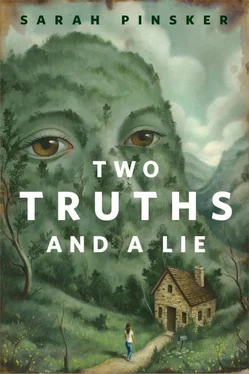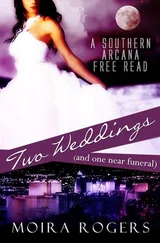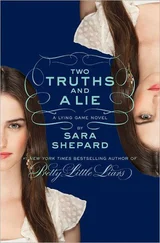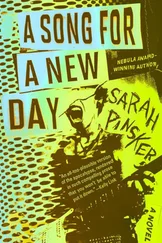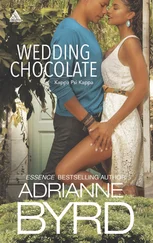“Who was that guy? Why did they give him a kids’ show?”
“The public television station had funding trouble and dumped all the shows they had to pay for—we had to get cable for you to watch Sesame Street and Mister Rogers’ Neighborhood . They had all these gaps to fill in their schedule, so anybody with a low budget idea could get on. That one lasted longer than most—four or five years, I think.”
“And nobody said, ‘That’s some seriously weird shit?’”
“Oh, we all did, but someone at the station argued there were plenty of peace-and-love shows around, and some people like to be scared, and it’s not like it was full of violence or sex, and just because a show had kids in it didn’t mean it was a kids’ show.”
“They expected adults to watch? That’s even weirder. What time was it on?”
“Oh, I don’t remember. Saturday night? Saturday morning?”
Huh. Maybe he was more like those old monster movie hosts. “That’s deeply strange, even for the eighties. And who was the guy playing Uncle Bob? I tried looking it up on IMDB, but there’s no page. Not on Wikipedia either. Our entire world is fueled by nostalgia, but there’s nothing on this show. Where’s the online fan club, the community of collectors? Anything.”
Her mother frowned, clearly still stuck on trying to dredge up a name. She shook her head. “Definitely Bob, a real Bob, but I can’t remember his last name. He must’ve lived somewhere nearby, because I ran into him at the drugstore and the hardware store a few times while the show was on the air.”
Stella tried to picture that strange man in a drugstore, looming behind her in line, telling her stories about the time he picked up photos from a vacation but when he looked at them, he was screaming in every photo. If he were telling that story on the show, he’d end it with, “and then you got home from the drugstore with your photos, but when you looked at them, you were screaming in every photo too.” Great. Now she’d creeped herself out without his help.
“How did I not have nightmares?”
“We talked about that possibility—all the mothers—but you weren’t disturbed. None of you kids ever complained. It was a nice break, to chat with the other moms while you all played in such a contained space.”
There was a vast difference between “never complained” and “weren’t disturbed” that Stella would have liked to unpack, but she fixated on a different detail. “Contained space—you mean while we watched TV, right?”
“No, dear. The studio. It looked much larger on television, but the cameras formed this nice ring around three sides, and you all understood you weren’t supposed to leave during that half hour except for a bathroom emergency. You all played and we sat around and had coffee. It was the only time in my week when I didn’t feel like I was supposed to be doing something else.”
It took Stella a few seconds to realize the buzzing noise in her head wasn’t the wasp on the screen. “What are you talking about? I was on the show?”
“Nearly every kid in town was on it at some point. Everyone except Marco, because his brother was acting up by the time you two were old enough, and Celeste pulled Denny and enrolled both boys in karate instead.”
“But me? Ma, I don’t remember that at all.” The idea that she didn’t know something about herself that others knew bothered her more than she could express. “You aren’t making this up?”
“Why would I lie? I’m sure there are other things you don’t remember. Getting lice in third grade?”
“You shaved my head. Of course I remember. The whole class got it, but I was the only one whose mother shaved her head.”
“I didn’t have time to comb through it, honey. Something more benign? Playing at Tamar Siegel’s house?”
“Who’s Tamar Siegel?”
“See? The Siegels moved to town for a year when you were in second grade. They had a jungle gym that you loved. You didn’t think much of the kid, but you liked her yard and her dog. We got on well with her parents; I was sad when they left.”
Stella flashed on a tall backyard slide and a golden retriever barking at her when she climbed the ladder and left it below. A memory she’d never have dredged up unprompted. Nothing special about it: a person whose face she couldn’t recall, a backyard slide, an experience supplanted by other experiences. Generic kid, generic fun. A placeholder memory.
“Okay, I get that there are things that didn’t stick with me, and things that I think I remember once you remind me, but it doesn’t explain why I don’t remember a blacked-out TV studio or giant cameras or a creepy host. You forget the things that don’t stand out, sure, but this seems, I don’t know, formative.”
Her mother shrugged. “You’re making a big deal of nothing.”
“Nothing? Did you listen to his stories?”
“Fairy tales.” “Now I know you didn’t listen. He was telling horror stories to seven-year-olds.”
“Fairy tales are horror stories, and like I said, you didn’t complain. You mostly played with the toys.”
“What about the kids at home watching? The stories were the focus if you weren’t in the studio.” “If they were as bad as you say, hopefully parents paid attention and watched with their children and whatever else the experts these days say comprises good parenting. You’re looking through a prism of now, baby. Have you ever seen early Sesame Street ? I remember a sketch where a puppet with no facial features goes to a human for ‘little girl eyes.’ You and your friends watched shows, and if they scared you, you turned them off. You played outside. You cut your Halloween candy in half to make sure there were no razor blades inside. If you want to tell me I’m a terrible parent for putting you on that show with your friends, feel free, but since it took you thirty-five years to bring this up, I’m going to assume it didn’t wreck your life.”
Her father rang the dinner gong inside the house, a custom her parents found charming and Stella had always considered overkill in a family as small as theirs. She and her mother stood. Their glasses were still mostly full, the melting ice having replaced what they’d sipped.
She continued thinking over dinner, while she related everything she and Marco had unearthed to her mildly curious parents, and after, while scrubbing the casserole dish. What her mother said was true: She hadn’t been driven to therapy by the show. She didn’t remember any nightmares. It just felt strange to be missing something so completely, not to mention the questions that arose about what else she could be missing if she could be missing that. It was an unpleasant feeling.
After dinner, while her parents watched some reality show, she pulled out a photo album from the early eighties. Her family hadn’t been much for photographic documentation, so there was just the one, chronological and well labeled, commemorating Stella at the old school playground before they pulled it out and replaced it with safer equipment, at a zoo, at the Independence Day parade. It was true, she didn’t recall those particular moments, but she believed she’d been there. The Uncle Bob Show felt different. The first time she’d uttered the show’s name, she’d thought she’d made it up.
She texted Marco: “Did Denny have all the Uncle Bob episodes on tape or only the ones he was in? Thanks!” She added a smiley face then erased it before she hit send. It felt falsely cheery instead of appreciative. His brother had just died.
She settled on the couch beside her parents. While they watched TV, she surfed the web looking for information about The Uncle Bob Show , but found nothing. In the era of kittens with Twitter accounts and sandwiches with their own Instagrams and fandoms for every conceivable property, it seemed impossible for something to be so utterly missing.
Читать дальше
